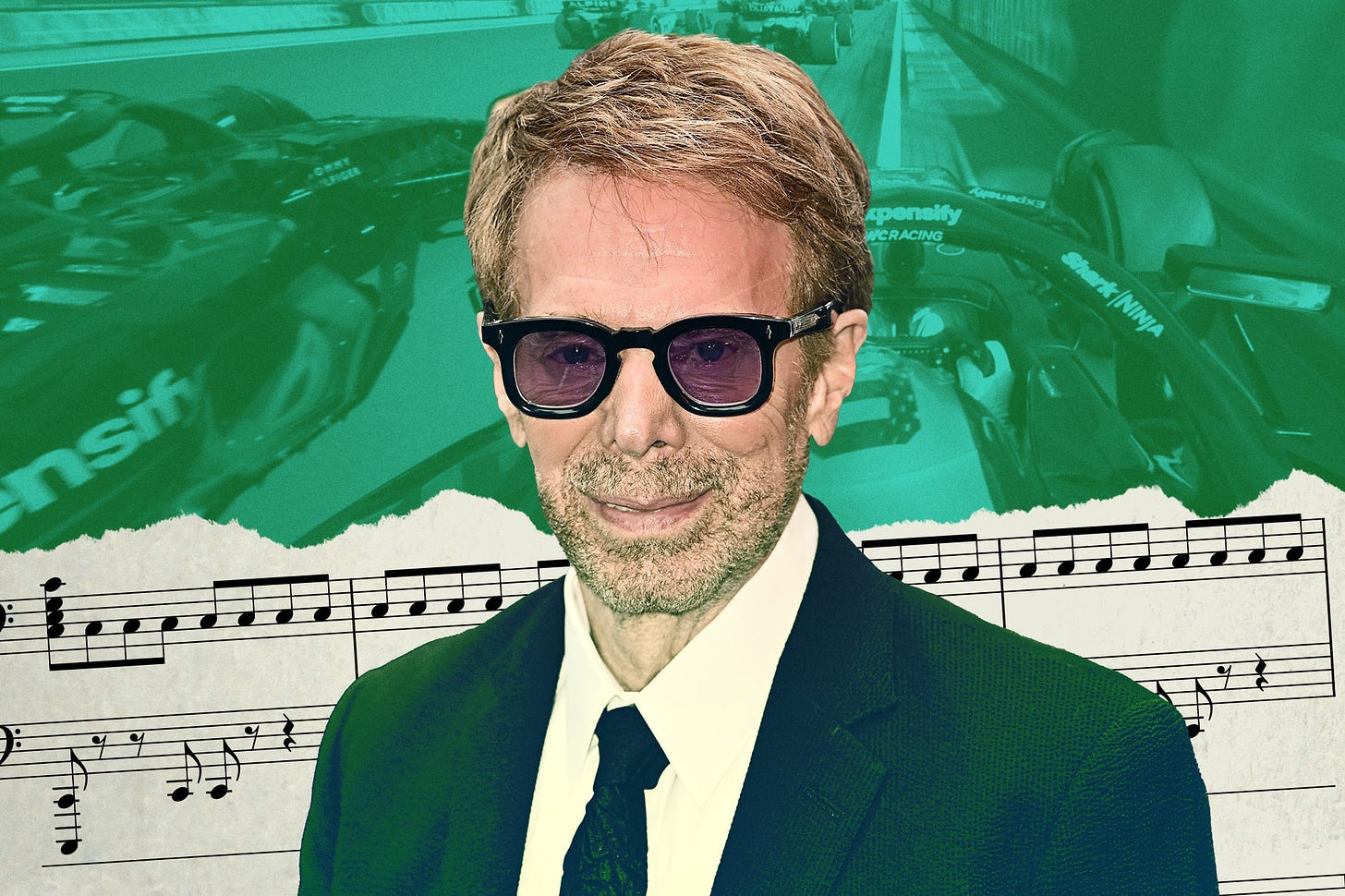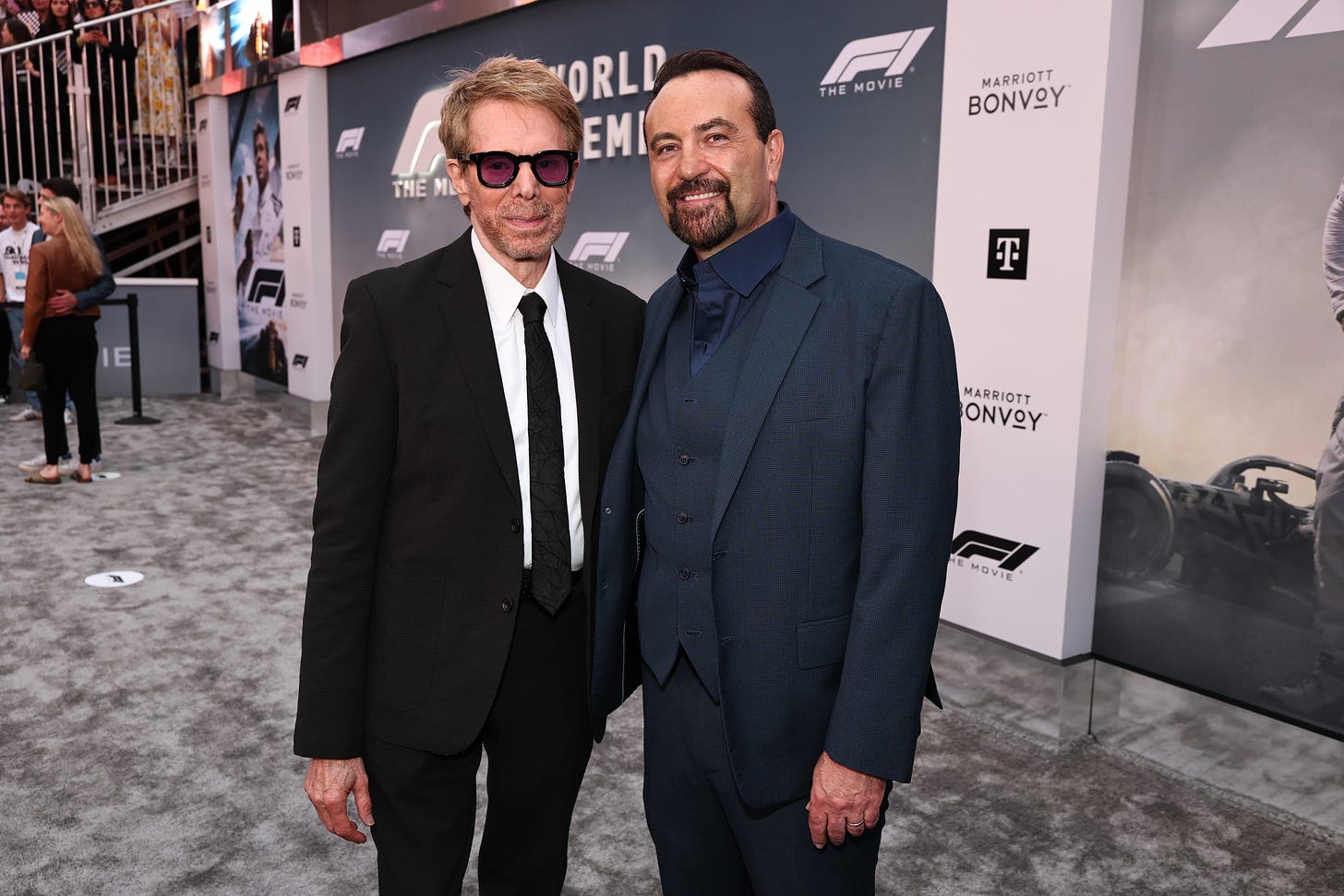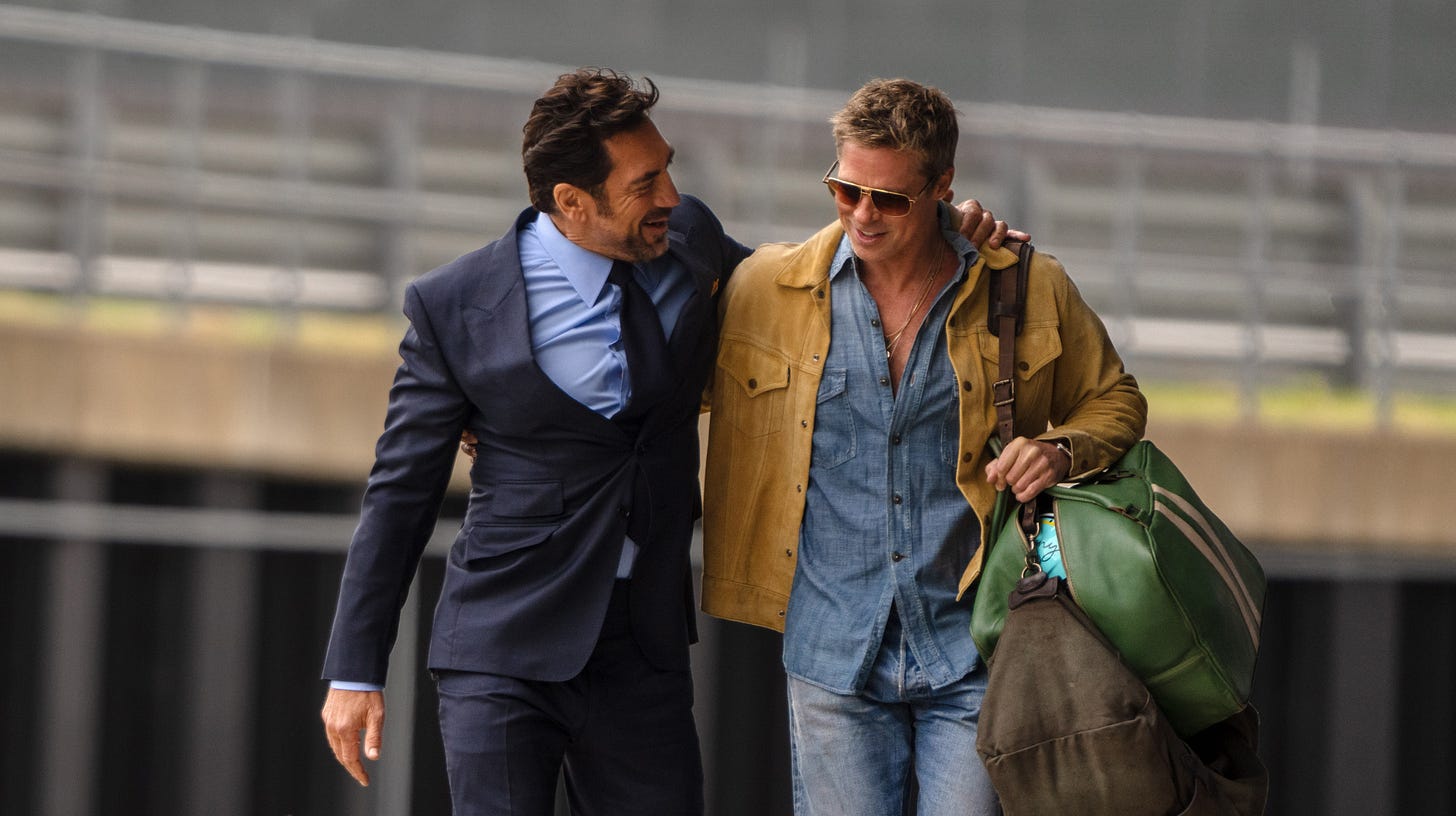'Top Gun' to 'F1': Jerry Bruckheimer on the Art of the Blockbuster Banger
The producer has long matched megahits with smash soundtracks. Now the mastermind tells me how he does it

I write about where music and Hollywood meet. I interviewed Billy Idol, The Last of Us composer Gustavo Santaolalla and spoke to White Lotus composer Cristobal Tapia de Veer about his feud with show creator Mike White. I’m at rob@theankler.com
Producing legend Jerry Bruckheimer and blockbuster soundtracks go together like a jumbo popcorn and that delicious gloop movie theaters promote as “butter.” Throughout his career, Bruckheimer’s big-budget bacchanals with major stars and splashy effects have defined generations.
I don’t think he’ll mind me saying that I grew up on his films (after all, he opened our conversation with an effusive, on-the-record “I love The Ankler!”). In middle school, I was absolutely obsessed with 2001’s Pearl Harbor and its epic soundtrack (yeah, I was a weird kid), which came armed with that Faith Hill ballad “There You’ll Be.” Three years earlier, Bruckheimer’s Armageddon was a blockbuster hit with its own chart-topping single, Aerosmith’s ubiquitous “I Don’t Wanna Miss a Thing” (written by former Notable subject Diane Warren, mind you, who was inspired by an actual line James Brolin once cooed to Barbra Streisand). Both tracks earned Oscar nominations in their day.
But it’s almost hard to think of any Bruckheimer production without killer music. He’s the man who produced Bad Boys, Flashdance, Top Gun and its sequel and Beverly Hills Cop, all hit films inextricably tied to culture-defining songs. (Damn, now I have “Axel F” stuck in my head.)
Next Friday, Bruckheimer is behind another muscular movie with blockbuster hopes and some high-octane songs: F1, the Brad Pitt Formula 1 racing vehicle (get it?) that takes audiences on a trip around the world and capitalizes on the global popularity of the sport. Fueling the engine (last one) is its compilation soundtrack, featuring original tracks from Don Toliver and Doja Cat (lead single “Lose My Mind”), Ed Sheeran, Rosé, Tate McRae and more. The record comes from a partnership with the powers that be at Atlantic Records, including Atlantic’s west coast president Kevin Weaver, the producer behind F1 and several hit movie soundtracks, including Barbie and Twisters.
In my interview with Bruckheimer, the producer spoke eloquently to me about the sheer power of music, calling it “the voice of the Gods.” That sentiment was in mind while attending the recent Songwriters Hall of Fame gala in New York City, which was a special night. It was a twist of fate that it took place right after the death of Brian Wilson, as his Beach Boy cohort Mike Love was inducted and gave a heartfelt speech.
“My first cousin by blood but brother in music, together we set the stage for some of the most successful music collaborations of all time,” he said into the mic before singing “God Only Knows.” I’m pretty sure there wasn’t a dry eye in the room.
Other inductees this year included George Clinton, who wore a Sly and the Family Stone shirt in honor of the recently deceased funk legend, Sly Stone. Former Notable subject Stephen Schwartz was honored as well, in addition to Rodney “Darkchild” Jerkins, the prolific producer (everything from Destiny’s Child’s “Say My Name” to Lady Gaga and Beyoncé’s “Telephone”) whose extremely talented children sang a melody of his hits and blew the crowd away.

Bruckheimer’s penchant for music has nicely collided with Atlantic’s bona fides for curating blockbuster soundtracks. The label launched Charlie Puth into superstardom when the then-unknown was plucked to join Wiz Khalifa for the emotional Furious 7 ballad “See You Again” that paid tribute to the Fast and the Furious franchise’s deceased star, Paul Walker. Last year, Weaver’s team watched as Billie Eilish’s Barbie track “What Was I Made For?” took home the Oscar for best original song, one of three singles from the Greta Gerwig film’s soundtrack to find chart success. The label clearly knows the fine art of soundtrack compilations that reverberate through culture.
Separately, in conversations woven together below, I spoke to Bruckheimer and Weaver about the arduous process that goes into putting movie soundtracks together, why sometimes they have to reject major artists and what made Formula 1 such ripe material for a diverse slate of performers. “F1 is the only sport in the world where your teammate is one of your biggest competitors,” Bruckheimer told me. “That adds an enormous amount of drama.”

Rob LeDonne: Jerry, your films are known for having incredible music. Is compiling a killer soundtrack always the plan when you start a project? What’s the process?
Jerry Bruckheimer: What happens is, you have editors, and when they cut a scene, sometimes they’ll throw a song against it, and it’s usually a current song. So you see the movie and get used to it, and you say, ‘Okay, we’re not gonna use that song. What do we do? We gotta replace it.’ So, you have to find artists or record companies. In the case of F1, we approached Kevin Weaver at Atlantic Records. Our entire team, including Brad Pitt, curated these songs for the movie. It was an amazing feat for Kevin to get all these fabulous artists to work on this movie.
RL: Can you give me an example of a placeholder?
JB: Going back to the original Top Gun, I think we had a Springsteen song in there, I think it was “Born to Run,” that was a song that was playing, and we had to replace it. When it comes to the actual soundtracks, we’ve had so many iconic songs going back to American Gigolo with “Call Me” from Blondie, and then Flashdance, where we had another huge success with the Irene Cara song, “Flashdance… What a Feeling.” So it’s part of the DNA of some of these movies, and sometimes it happens that we’ve been very fortunate to get great songs for most of our movies.
RL: Kevin, at Atlantic Records, you’ve worked on so many significant soundtracks before F1. How do you know when a film is ripe for an incredible soundtrack?
Kevin Weaver: A big part of it is gut, to be honest with you. We’re kind of constantly watching what’s in development and what’s coming down the pike and just trying to make smart bets based on the things that we believe fit the criteria of what we’re looking to accomplish. Usually, that’s a massive global IP. We just lean in, and it’s a passion for these things that drives it. I find when we're able to do that, it seems to connect relatively well.
It’s pretty well established what we do here at Atlantic Records with respect to these kinds of projects. I think all the studios clearly understand the marketing value that a big soundtrack can have: multiple hits, singles, world-building across short-form content and social media. Hopefully, it all builds towards the opening weekend of the picture, with all the momentum we’re able to create together. But, at Atlantic Records, we’re incredibly selective about what we do from a bandwidth perspective. These are a massive lift on the creative, A&R, marketing and all the partnership stuff.
RL: Jerry, I was wondering, at what point in the production process do you realize that you could have a compilation soundtrack, rather than just a score?
JB: You never know. You just try stuff. The composer will come in and write something. If it works, great. If not, you try to put a song in there. Sometimes the words of the song carry some of the emotion of the characters in the movie, so that’s helpful. But when you work with someone like (F1 composer) Hans Zimmer, he could score the entire movie, and it’d be fantastic. But sometimes you want to throw other voices in, and it’s a great way to promote the movie. The music helps promote the film. I'm not sure if you’ve seen the list of artists we have, but it’s phenomenal.
RL: I was joking with somebody about how you’ll never see a project that has both Chris Stapleton and Doja Cat on it. What was the thinking behind that?
JB: Yeah, I think that’s because of the sport. The sport itself is multicultural. It’s around the world. They traveled to, I think, 22 different tracks. That’s what the drama of the story is. So we packed it with all these fantastic, diverse genres. When you have Chris Stapleton, who’s a country artist, and then you have Rosé from Blackpink and Tate McRae, whose song “Just Keep Watching” just took off…
RL: Kevin, how does one wrangle all of these disparate artists together? I assume it’s no easy task.
KW: So usually the process is, I’ll get to see some scenes early on, like with Twisters and Barbie. On this one, Joseph Kosinski, the director, had returned from shooting the movie and had assembled a rough cut. We went over and got to see a bunch of the scenes that he felt like could be the important music moments in the film. That always becomes really informative. Then with Brandon Davis (Atlantic EVP and co-head of pop/pock A&R) and Joseph Khoury (SVP A&R/marketing), who both co-produced the album, the three of us kind of lock arms and then start to align around creative strategy. David Taylor from Apple was very much in the trenches with us on all of this as well (since Apple Original Films is the production company). We go back from that, and then we’d look at the narrative. What’s the temp music that makes up the cues, and who do we think are the contemporary artists that kind of speak to that? Fulfilling the need for each of those individual moments, we start to put together something akin to a mood board, including a playlist and creative ideas about the artists, songwriters and producers we feel hit the sweet spot for the various moments and needs in the film. And then we'll start going out having artist conversations. Almost every single artist was brought in to see a scene or scenes.
RL: Jerry, from your unique perspective, what’s the secret sauce to making a good soundtrack?
JB: I’ll tell you what it is. We don’t jukebox a movie. What happens sometimes is they try to jam in a bunch of songs that have no relevance or emotional hook for the scene that they’re in. And it just doesn’t work. Everything we do is handcrafted. I don’t care how big the artist is; the song has to work in the scene. We’ve turned down some of the biggest artists in the world, not because it was a bad song — it was a great song — but it didn’t convey the emotional energy that that scene needed. And that’s why it took so long to put the soundtrack together. I mean, there was a lot of disappointment. Sometimes we had a great artist who couldn’t fit it into the movie. Certainly, the record labels could say, “Wait a second, you gotta put that song in!” But if it doesn’t work, we're not gonna put it in. Soundtracks that include a collection of songs unrelated to the scene don't benefit the movie, and they also fail to enhance the soundtrack.
RL: One thing I found interesting is that even though this is an Atlantic Records project, the soundtrack features artists who aren’t signed with the label, like Doja Cat. Kevin, can you tell me how that works?
KW: I mean, we have a lot of our Atlantic artists on this, like Burna Boy or Ed Sheeran. We always look to utilize our own artists whenever possible when we do these. Still, we also seek to select the best songs from artists that make the most sense. When we kind of lead with that fundamental, it all seems to work out at the end of the day, for the most part.
If we have an artist in mind who we think is the perfect fit for this creative need, we lead with the creative and let the business follow. When you do that, you organically do best for a project. It’s a lot of work, but we always get it done. And again, it’s because we lead from a very pure place of creative integrity that I believe allows that to happen.
RL: Do blockbuster soundtracks help sell a movie? Is it the movie that lifts the soundtrack, or is it an all boats rise situation?
JB: Exactly, all boats rise. They help each other, they promote the movie, and the movie promotes them. But you gotta make a successful movie.
RL: I’m reminded of something Scorsese once said on how “intoxicating” it is to see a scene cut together with a song for the first time. Jerry, what moments have been like that for you in your own career?
JB: Well, in Top Gun, “Take My Breath Away” was one that killed us — and the Top Gun theme was amazing, when we heard that. We used the same theme in Top Gun: Maverick. Flashdance’s “What a Feeling” was fantastic. Music is the voice of the Gods. It’s unbelievable. It makes you feel something, it makes you feel an emotion; sometimes it’s fun, sometimes you want it to be romantic and something that is spiritually interesting. That’s also what Hans Zimmer does with the score. He does things that are magical.
RL: Kevin, what about some soundtrack career highlights for you?
KW: I think I’m really fortunate to have been able to work on some of the most important and special films of our generation and by way of that, I have been able to contribute really meaningful songs to those movies. The hope for me is that every project has at least one of them. And some projects have a few of them. If you look at Barbie, we had a few songs that really stood out: the (Oscar-winning) Billie Eilish song “What Was I Made For?” “I’m Just Ken,” and songs from Dua Lipa, Lizzo and Charli XCX. And they all meant something different to me, but all in a somewhat equally profound way. But all of our projects have at least one song, if not a few songs, that connect emotionally with the world in a way that’s gonna go a lot deeper and broader than the four walls of the film. When I’m lucky enough to be able to accomplish that, it's one of the most rewarding things I could ever do with my life.
RL: Jerry, are blockbuster popcorn movies like this harder or easier to make these days?
JB: Every one is hard. None of 'em are easy. Even the failures are hard. So you just work hard. It has taken four years to get me talking to you today and get this movie together, and get the soundtrack to come out into the world.
RL: Last question, Jerry, I know you’ve been asked a variation of this in the past, but I’m not sure if you’ve ever been asked this specific version of it. Do you ever think we’ll see a day where people will watch an entire AI-generated movie in theaters?
JB: The way I look at it, I can’t predict the future. But when you see these things that kids are making with AI, they’re pretty good. So I can’t see why they wouldn’t build on it — as AI is getting more and more powerful — to make a movie. So yeah, I think that could happen. I don’t know if I’ll be alive when it happens, but I think it could happen.



